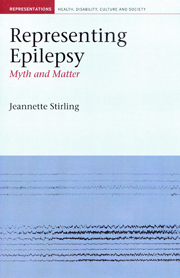Book contents
- Frontmatter
- Contents
- Acknowledgements
- Introduction
- 1 From Hippocrates to Shakespeare and Dickens: epilepsy's entry into ‘the circuit of culture’
- 2 Hystericity and hauntings: the female and the feminised
- 3 Notes from the borderlands: repressing the returned
- 4 The colonies
- 5 Because you're ‘you know. That way’
- Where to next? The ongoing story of epilepsy
- Bibliography
- Index
Where to next? The ongoing story of epilepsy
- Frontmatter
- Contents
- Acknowledgements
- Introduction
- 1 From Hippocrates to Shakespeare and Dickens: epilepsy's entry into ‘the circuit of culture’
- 2 Hystericity and hauntings: the female and the feminised
- 3 Notes from the borderlands: repressing the returned
- 4 The colonies
- 5 Because you're ‘you know. That way’
- Where to next? The ongoing story of epilepsy
- Bibliography
- Index
Summary
The epilepsies, like all other changes to physical and psychological health, are always experienced within a specific historical and cultural context. The specificities of these contexts will not only colour how an epilepsy is experienced and lived but also influence medical interpretations and responses to the syndrome: what the epilepsies meant to the physicians of ancient Greece is clearly not the same as their signification for the apostles of Jesus when he heals the afflicted son of a follower in the mountains of Bethsaida almost 500 years later. Within the spatiality of a late nineteenth-century mill, the seized body invokes a range of social responses, prohibitions and cultural meanings absent from these earlier interpretations. Similarly, understanding of epilepsy syndromes varies considerably between the neurologists of the late nineteenth century and their twenty-first-century counterparts.
The past twenty years or so have seen a large field of scholarship develop around social and culturally differentiated interpretations of illness, disease and what has become known in medical sociology as ‘illness behaviour’. It is argued in this field of scholarship that the signification and experiences of illness and illness roles are understood and internalised (naturalised) through complex cultural and social processes. The research of Christopher Ounsted and his team affords insight here: ‘Biographies and diseases can be understood only in the context of the historical period in which they occur’.
- Type
- Chapter
- Information
- Representing EpilepsyMyth and Matter, pp. 231 - 236Publisher: Liverpool University PressPrint publication year: 2010

